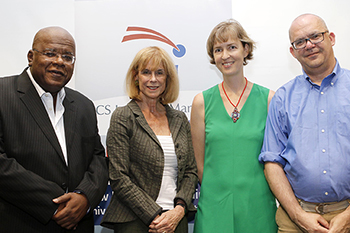Latest News Archive
Please select Category, Year, and then Month to display items
12 October 2020
|
Story Arina Engelbrecht
|
Photo Supplied
 Arina Engelbrecht from Organisational Development and Employee Well-being believes physical activity has a number of benefits for one’s health, including stress relief.
Arina Engelbrecht from Organisational Development and Employee Well-being believes physical activity has a number of benefits for one’s health, including stress relief.
Being physically active plays a big role in preventing the development of mental-health problems and in improving the quality of life of people experiencing mental-health problems.
Treatment for depression
Physical activity can be an alternative treatment for depression. It can be used as a stand-alone treatment or in combination with medication and/or psychological therapy. It promotes all kinds of changes in the brain, including neural growth, reduced inflammation, and new activity patterns are formed that promote feelings of calm and well-being. It releases endorphins – powerful chemicals in the brain that energise your spirit and make you feel good.
Physical activity can be very effective in relieving stress. Research in adults has found that physically active individuals tend to have lower stress levels compared to individuals who are less active. It also leads to improved sleep. When a person sleeps better and feels more rested, overall quality of life improves. They cope better with daily life stressors.
Reduce Alzheimer's risk
Regular physical activity can reduce your risk of developing Alzheimer's disease by up to 50%. It can also slow down further deterioration in those who have already started to develop cognitive problems. It stimulates the brain’s ability to maintain old connections as well as to make new ones.
A study asked people to rate their mood immediately after periods of physical activity (e.g. going for a walk/run, cycling, doing housework) and periods of inactivity (e.g. reading a book or watching television). Researchers found that participants felt more content, more awake, and calmer after being physically active compared to after periods of inactivity.
In conclusion, people who are physically active feel a sense of well-being, feel more energetic throughout the day, sleep better at night, have sharper memories, and feel more relaxed and positive about themselves and their lives.
“Being physically active not only changes your body, it changes your mind,
attitude, and your mood.” – Arina Engelbrecht
UFS hosts first ACS Institute held on African soil
2015-12-08

The first ever Association for Cultural Studies (ACS) Institute hosted on the African continent is taking place on the Bloemfontein Campus. At the event are, from the left: Prof Jonathan Jansen, Vice-Chancellor and Rector of the UFS; Prof Jean Comaroff, Alfred North Whitehead Professor of African and African-American Studies and Anthropology at Harvard University; Prof Helene Strauss, Chair of the Department of English at the UFS; and Prof Gil Rodman, Chair of the Association for Cultural Studies and Professor of Communication Studies at the University of Minnesota.
Photo: Johan Roux
|
The University of the Free State (UFS) is hosting the 2015 conference of the Association for Cultural Studies (ACS) Institute – the first time for this international event to take place on the African continent.
From 7 – 12 December 2015, some of the world’s leading scholars in cultural studies are taking part in the conference on the Bloemfontein Campus. The event has been organised by the UFS Department of English in collaboration with colleagues from other departments in the Faculty of the Humanities.
The ACS is the foremost international association for scholars in cultural studies, and has been hosting the biennial Crossroads in Cultural Studies Conference since 2006. In 2011, the ACS held its inaugural institute at the University of Ghent (Belgium), followed, in 2013, by one at the Alpen-Adria University Klagenfurt (Austria). As the 2015 meeting of the institute is the first to be held in Africa, the organisers aim at highlighting the contributions that scholars from our continent and other (post)colonial contexts have made to cultural studies, even as it engaged many of the long-standing theoretical concerns generated for the field by scholars from the Global North.
Themed ‘Precarious Futures’, the conference explores how cultural studies might assist in charting more equitable futures by reflecting critically on the cultural, economic, and political trajectories within which precariousness – a state increasingly anticipated for the planet – might be altered. Experts in a diversity of disciplines are sharing their perspectives in the form of seminars and lectures.
Keynote lectures are delivered by Prof Jean Comaroff (Harvard University), Prof John Erni (Hong Kong Baptist University), Dr Jo Littler (City University London), Dr Zethu Matebeni (University of Cape Town), and Prof Handel Kashope Wright (University of British Columbia).
In her opening lecture on Monday 7 December 2015, Prof Comaroff addressed the challenging relationship of law, detection, and sovereignty in contemporary African polities within the South African post-apartheid context.
Topics discussed include climate change; the archives of everyday life; cross-racial intimacies; ethnography; meritocracy; cultural studies and human rights; China and globalisation; gender, sexuality, and race; and governance, embodiment and the work of care.